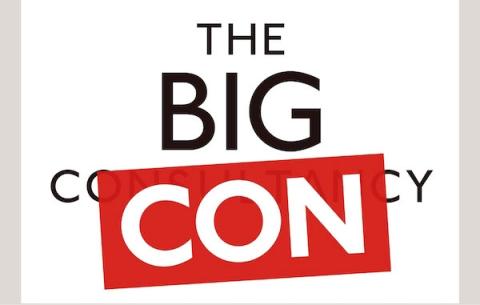Management Consultants: Con Men or Fall Guys?
A review of The Big Con, by Professor Mariana Mazzucato and Rosie Collington
There has recently been a lot of interest and discussion about the “Big Con”, in which the authors accuse consultants of performing a confidence trick on their clients. According to the authors, consultants trick clients into believing that they have better capabilities than them, the clients engage consultants instead of developing their own capabilities, and as a result become even more dependent on engaging consultants.
Given their academic background, I would have expected that the authors had gathered facts about consultants’ behaviour and developed their conclusions based on that factual knowledge. Instead, they seem to have reached the conclusion that consultants are confidence tricksters, and then attempted to find facts that could support their assumption. And whenever there are insufficient facts to support that conclusion, inaccuracies, supposition and innuendo will do.
As a result, the story of the “Big Con” appears to take place in a world in which the largest consultancies recruit all of their staff straight from university, sell their services based on outlandish claims about their capabilities to gullible clients, most of whom they either went to public school or university with or are former employees. The gullible clients who fall for this confidence trick appear to have little or no say in the services that the consultants provide.
To support their claim, the authors do provide a number of examples of poor performance and behaviour by consultants including the role of a former McKinsey consultant in problems at US pharmaceutical company Valeant Pharma as well as a number of potential conflicts of interest. These include the investments of the McKinsey Investment Office (MIO) Partners in organisations impacted by consulting services provided by McKinsey, consultancies that promote their climate change services while continuing to work for the world’s largest petrochemical companies, and the audit-based firms whose consulting divisions are awarded government contracts while their taxation divisions advise corporate organisations on how to reduce the taxes that they pay to the same government.
However, the authors then go further and attempt to blame consultants for a wide range of problems in which they had little or no involvement. They do this in a number of ways.
They make no distinction between the consulting services provided by the Big Four audit firms (Deloitte, EY, KPMG and PwC) and those provided by their audit and taxation divisions. The collapse of outsourcing company Carillion has resulted in KPMG, due to issues with its audit, being fined by the Finance Reporting Council (FRC) and having to reach a settlement with Carillion’s creditors. The authors prefer to imply that the consulting divisions of the Big Four audit firms were to blame for Carillion’s collapse because “in every facet of outsourcing….the Big Four were there”.
If they consider that an organisation has caused a problem, it is referred to as a consulting company even if it does not provide consulting services. On this basis, providers of outsourced transactional processing services, such as Serco, Sodexo and G4S, are deemed to be consulting companies and the impact of using outsourcers is considered to be caused by consultants. Having identified Serco as “one of the biggest winners of contracts for governments’ responses to the (COVID-19) pandemic” they proceed to blame consultants for the health and economic consequences faced by UK citizens resulting from “the government’s decision to outsource to consultancies so much of the early COVID-19 response”.
They also blame consultants for the impact of a number of other decisions made by the UK Government during the COVID-19 pandemic. The authors cite the cases of the £30m contract awarded to the landlord of the Health Secretary Matt Hancock’s local pub and the PPE contract worth £108 million awarded to a pest control company with net assets of £18,000. These are considered to be the fault of consultants because the “coup of ‘cronyism’ during the pandemic in the UK could not have happened without the hollowing out of internal contracting capacity”, which the authors think was caused by the UK government’s increased use of consultants to replace permanent members of staff. It’s a weak argument made even weaker by failing to recognise that, according to analysis by the Institute of Government, although the number of staff employed by the UK civil service reduced from 470,000 in 2010 to 400,00 in 2015, it had grown back to 470,000 by 2021.
The authors are also critical of the way that the larger consultancies attempt to give their publications and education programmes academic credibility by giving them names such as the McKinsey Global Institute (MGI) and IBM Center for the Business of Government. The academic authors seem unaware of the irony of producing a book whose front cover proclaims: “The Big Con - How the consulting industry weakens our businesses, infantilizes our governments and warps our economies” and, in describing the flight of capital from Africa, claims that consultants “have not driven capital flight, but they have surfed the waves it has created”.
Their criticism is not confined to consulting firms. They mention that the book In Search of Excellence by McKinsey consultants Tom Peters and Robert Waterman, which has sold over five million copies, was “panned by many academics for lacking rigour and nuance”. However, 58 pages later Peters is commended for warning “against the perils of a consultancy simultaneously providing advice to a company it has investments in”. Perhaps it is because he was an academic at that point.
Based on this book, rather than being con men, consultants appear to be the fall guys for much that has gone wrong in the world in recent years. However, there is indeed a confidence trick played by a number of consulting companies, but the authors fail to identify it, although they do nearly get there at one point. What do you think it is?
Jim Foster, member of the CMCE leadership team
